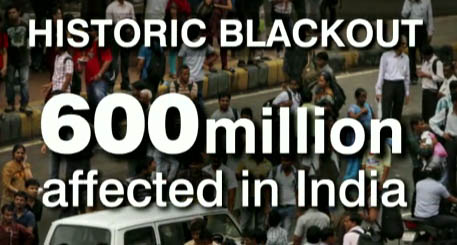
When 600 million people lose power, who should be responsible for being prepared to get through it: Individuals or government? That question is being asked as India experiences the most widespread blackout in history.
As the video report above shows, a power grid failure in the northern part of the country caused a blackout affecting a population equal to North and Central America. By comparison, the video notes that the most disruptive blackout in United States history affected 55 million people in 2003.
The difference between the two events isn't as much a matter of population as it is economy. The average GDP per capita in the U.S. is roughly $48,000, according to the CIA World Fact Book. In India, it's closer to $3,800.
Despite India's population being four times that of the U.S., it consumes 600.6 billion kWh of electricity per year. That figure is 3.741 trillion kWh in the U.S.
This means people in India had fewer resources to set aside for blackouts, yet didn't lose as much on the personal level when the power went out. It was the large, socialized pieces of infrastructure that took it on the nose. As the video showed, scores of people were stranded waiting for public transportation, their only option for travel.
The opposite happened in the most recent blackout in the U.S. (read about it here). The power outage affected a fewer number of people, but they had much more to lose at the personal level. Individuals generally relied on their own energy consumption to get through the day.
The power went out in both cases, yet there is a major difference. In India, individuals lacked the resources to set aside for emergencies. In the U.S., the average person had much more to put in reserve. This begs the question about where the responsibility of preparedness falls. Is it the individual or is it government?
For example, is it up to individuals to store potable water for emergencies or is government responsible? Should individuals in India, where rolling brownouts are common, anticipate these events and prepare for them? Should people in the U.S., where wealth allows for individual preparedness, still expect an effective government response to disasters?
It's this author's view that there is only the illusion of a middle ground when it comes to blackout preparedness. Large-scale electricity production is a socialized function heavily regulated by government. Private companies sanctioned to perform this work are not beholden to individuals, only to the governments that approved their monopolistic existence. That would seem to place the burden of blackout preparedness on government.
However, government disaster relief services only go so far. Literally. Help has to be shipped in from other places. That's going to take time. It could be hours, days or weeks. The response to Hurricane Katrina is one example.
The same is true of any place in the world. Yes, there will be governments preparing for disaster. No, it won't be a perfect response. Don't be lulled into a false sense of security.
The reality is individuals are responsible for their well-being, and need to be prepared to the furthest extent they're able. True, people in developing countries, such as India, are at a disadvantage when it comes to preparedness. But the core principles of survival are as true today as they were thousands of years ago.
In the end, no one is going to help you but yourself.
Build a Survival Kit, Make it Through a Blackout
 When Federal Emergency Management Agency (FEMA) trucks roll into town to offer relief, no one will hand you a pack and say, “Here's the survival kit I made just for you.” It's up to individuals to be prepared by building their own survival kits. Learn how in Build Your Own Survival Kit.
When Federal Emergency Management Agency (FEMA) trucks roll into town to offer relief, no one will hand you a pack and say, “Here's the survival kit I made just for you.” It's up to individuals to be prepared by building their own survival kits. Learn how in Build Your Own Survival Kit.
Click here to order Build Your Own Survival Kit for 34% off retail.

![Best Concealed Carry Guns In 2025 [Field Tested] Wilson Combat EDC X9S 1](https://gundigest.com/wp-content/uploads/Wilson-Combat-EDC-X9S-1-324x160.jpg)


![Best 9mm Carbine: Affordable PCCs [Tested] Ruger Carbine Shooting](https://gundigest.com/wp-content/uploads/Ruger-Carbine-Shooting-100x70.jpg)
![Best AR-15: Top Options Available Today [Field Tested] Harrington and Richardson PSA XM177E2 feature](https://gundigest.com/wp-content/uploads/Harrington-and-Richardson-PSA-XM177E2-feature-100x70.jpg)

The way I see it, in America, those in the urban areas and most of those in the suburbs are not willing to prepare and are screwed in a disaster event. Pretty much only the rural areas are made up of people, who the majority will by nature and necessity, prepare for most anything thrown at them.
Let`s face it, you just cannot compare Americans to any other people. While we have, as a culture, a seemingly growing number of people who wish for the government to be their everything, we still have a significant number of Americans who are the throw backs, the “rugged individuals”, who can and will, proudly, fend for themselves as best they can in any scenario. This is still part of an American heritage for many people, and not to sound haughty, but even though many peoples, in many third-world countries live a much harsher day-to-day life than we do in America, I firmly believe that, when necessary, sacrifice, enduring fortitude, and that legendary pioneering spirit set Americans well apart from the rest of the world.